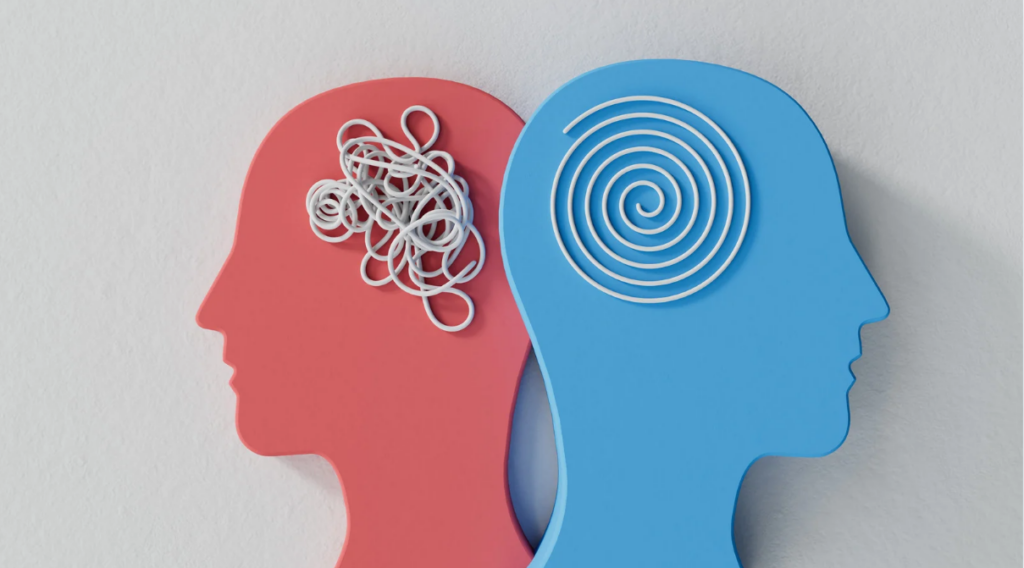
You can’t seem to shut your mind off—yet you feel completely drained. Some days bring racing thoughts and worry; others, a heavy fog of sadness and lost motivation. It’s hard to tell what’s really going on. That’s where understanding anxiety vs depression becomes so important.
If you’ve ever wondered whether it’s one, the other, or both, you’re far from alone. These two mental health conditions often overlap, making it difficult to separate restlessness from exhaustion or fear from hopelessness.
In this article, we’ll unpack anxiety vs depression, how they differ, why they often show up together, and how recognizing both can help you take the first steps toward clarity and healing.
The Basics: What Are Anxiety vs Depression?
Before diving into differences, it helps to understand what each condition truly means.
Anxiety is your body’s natural response to stress — a heightened state of alertness designed to protect you from danger. But when that sense of worry becomes constant, uncontrollable, and disproportionate to the situation, it can evolve into an anxiety disorder. You may feel keyed up, tense, or flooded with racing thoughts that never seem to quiet down.
Depression, on the other hand, isn’t just sadness. It’s a persistent sense of emptiness, hopelessness, or emotional flatness that lasts for weeks or months. People with depression often lose interest in things they once enjoyed and struggle to find motivation, even for simple daily tasks.
Both are legitimate medical conditions — not personality flaws or signs of weakness — and both are treatable with the right support.
How Anxiety Feels: The Overactive Mind and Body
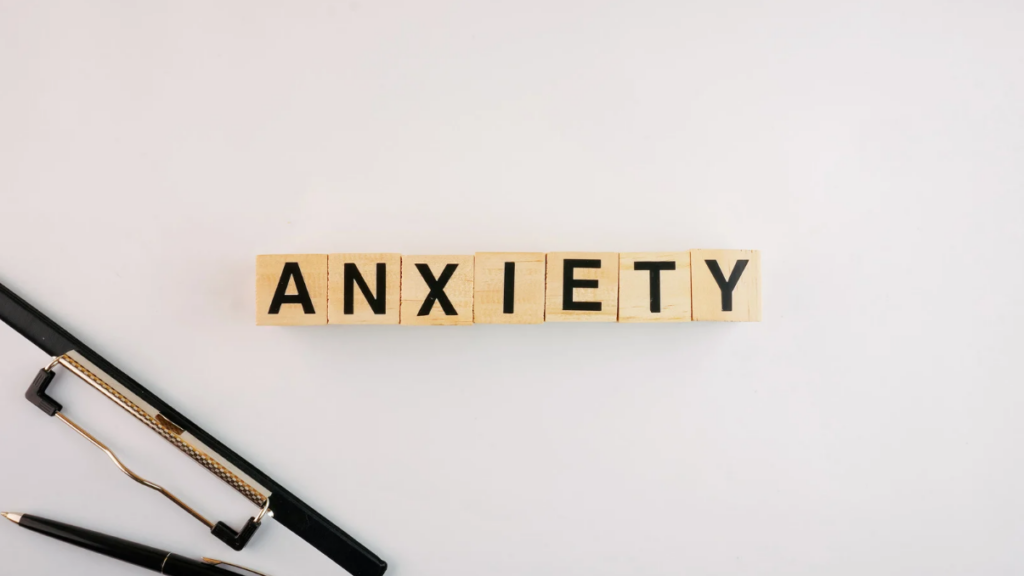
Anxiety feels like your mind is constantly running a marathon while your body braces for impact. It’s a mix of fear, hypervigilance, and “what-if” thinking that can make it hard to focus on the present.
Common symptoms of anxiety include:
- Persistent, excessive worry
- Restlessness or feeling “on edge”
- Muscle tension, headaches, or stomach discomfort
- Rapid heart rate or chest tightness
- Trouble concentrating or sleeping
- Irritability or perfectionism
Emotionally, anxiety often feels like anticipation without relief — the mind’s way of preparing for something that might never happen. You might find yourself replaying past conversations, fearing judgment, or catastrophizing small issues. Physically, your body mirrors that mental stress through shallow breathing, trembling, or sweating.
Example: You send a text and don’t get an immediate reply. Within minutes, your mind races — Did I say something wrong? Are they mad at me? Anxiety thrives on uncertainty, keeping your body stuck in fight-or-flight mode even when there’s no real threat.
How Depression Feels: The Emotional Numbness and Heavy Weight
Depression feels different — less like overactivity and more like a loss of vitality. You might not feel anxious energy; instead, everything feels heavier, slower, or muted.
Common symptoms of depression include:
- Persistent sadness, emptiness, or irritability
- Loss of interest in hobbies or social connection
- Fatigue or low energy
- Difficulty concentrating or remembering things
- Changes in sleep or appetite
- Feelings of guilt, worthlessness, or hopelessness
Depression often shows up as emotional exhaustion. You may want to engage with life but feel trapped behind an invisible wall. Even small tasks — brushing your teeth, replying to a message, getting out of bed — can feel monumental.
Example: A friend invites you out, and though part of you wants to say yes, you decline because you “just don’t have it in you.” Depression can make joy feel distant and unreachable.
Key Differences Between Anxiety vs Depression
Although anxiety and depression share certain symptoms — fatigue, irritability, and poor concentration — their core experiences differ.
| Feature | Anxiety | Depression |
| Emotional Focus | Future-oriented fear (“What if…?”) | Past or present-focused sadness (“Why bother…?”) |
| Energy Level | Overdrive, tense, restless | Drained, slow, heavy |
| Thought Patterns | Catastrophizing and overanalyzing | Hopelessness and self-blame |
| Behavioral Tendencies | Avoidance due to fear | Withdrawal due to loss of motivation |
| Physical State | Increased heart rate, hyperarousal | Slowed movement, fatigue |
In short, anxiety feels like too much energy, while depression feels like not enough.
When Anxiety vs Depression Occur Together
Here’s the tricky part — many people experience both anxiety and depression at the same time. Studies show that nearly half of those diagnosed with depression also meet criteria for an anxiety disorder. This is called comorbidity, and it’s more common than most realize.
When both conditions coexist:
- You may feel restless yet emotionally numb.
- You might worry about not being productive but lack the energy to start anything.
- Your body feels tired, but your mind won’t stop racing.
This combination can be especially exhausting — like pressing the gas and brake pedals at once. For instance, you might feel anxious about falling behind at work, but your depression makes it impossible to concentrate or get started.
Anxiety vs Depression: Why They Overlap
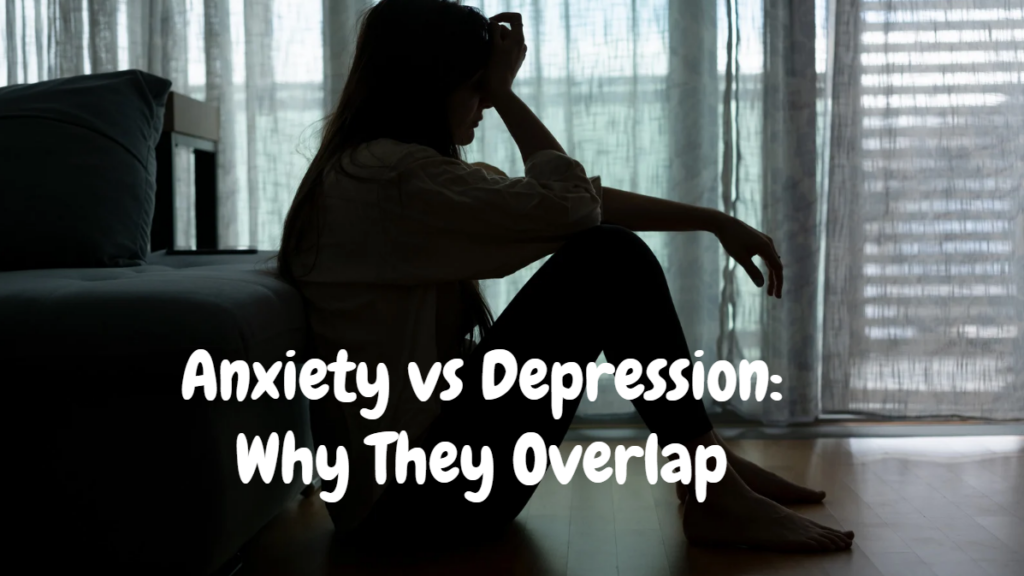
Anxiety vs depression often appear together because they share similar biological, psychological, and environmental roots.
1. Biological Factors
Both involve imbalances in neurotransmitters such as serotonin, dopamine, and norepinephrine — chemicals that regulate mood, motivation, and stress response. Genetics can also increase susceptibility, especially if mental health conditions run in the family.
2. Psychological Factors
Negative thinking patterns — such as self-criticism or perfectionism — can trigger both anxious worry and depressive self-blame. Chronic stress or unresolved trauma may also leave the brain stuck in “survival mode,” oscillating between fear and fatigue.
3. Environmental Factors
Major life changes, health challenges, grief, or ongoing stress (financial, relationship, or occupational) can all strain mental well-being. Poor sleep, isolation, or lack of physical activity further worsen symptoms.
Over time, anxiety can lead to depression when constant worry burns out the mind and body. Conversely, depression can trigger anxiety when feelings of hopelessness cause fear about the future.
The Hidden Signs You Might Be Overlooking
Anxiety vs depression don’t always look like panic attacks or visible sadness. Many people mask their symptoms behind a composed or even high-achieving exterior.
Subtle or hidden signs include:
- High-functioning anxiety: You appear organized and successful but feel constantly tense or afraid of failure.
- Smiling depression: You maintain a cheerful front while feeling empty inside.
- Irritability or frustration: Especially in men or teens, depression can show up as anger instead of tears.
- Physical symptoms: Headaches, fatigue, or digestive issues often reflect underlying emotional distress.
These hidden presentations can delay diagnosis and treatment. Recognizing them early helps you seek help before burnout or deeper despair sets in.
How to Know Which One You Have — or If It’s Both
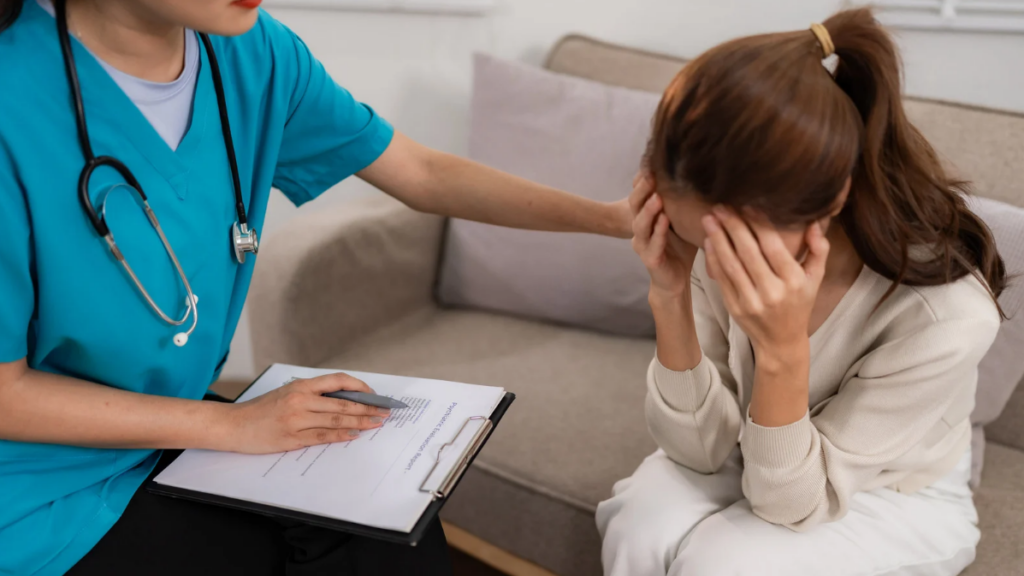
It’s common to wonder, Do I have anxiety, depression, or both? The truth is, only a qualified mental health professional can make that distinction through a comprehensive evaluation.
Still, reflecting on your experiences can provide clues:
- Do you feel more restless or more drained? (Anxiety = restless; Depression = drained)
- Is your mind racing or going blank? (Anxiety = racing; Depression = blank)
- Do you fear the future or feel hopeless about it? (Anxiety = fear; Depression = hopelessness)
Mental health providers use screening tools such as the GAD-7 (for anxiety) and PHQ-9 (for depression) to measure severity. They’ll also consider how long symptoms have lasted, how much they interfere with daily life, and whether other factors (like trauma, medical issues, or substance use) are contributing.
Remember: these labels are not boxes — they’re maps to help guide treatment and understanding.
When to Seek Professional Help
You don’t need to hit rock bottom to reach out. In fact, the earlier you seek help, the easier it is to manage symptoms effectively.
Consider reaching out if:
- Your anxiety or sadness interferes with work, school, or relationships
- You’ve lost interest in things that used to bring joy
- You experience panic attacks or emotional numbness
- Your sleep, appetite, or concentration changes drastically
- You’ve had thoughts of self-harm or suicide
If you ever feel unsafe with your thoughts, reach out immediately to your local emergency number or a trusted helpline (in the U.S., dial 988 for the Suicide and Crisis Lifeline).
You can begin with a psychiatric nurse practitioner, psychiatrist, therapist, or primary care provider — all trained to recognize and treat these conditions. You deserve help and healing, not silence or shame.
Treatment Options That Work
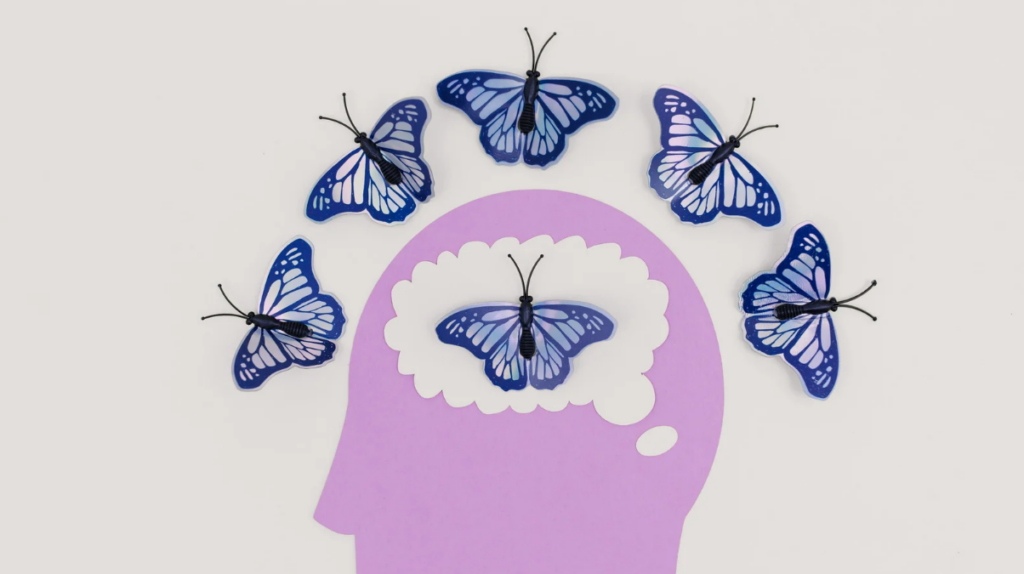
The good news: both anxiety vs depression are highly treatable. Recovery may take time, but effective options exist — often most powerful when combined.
1. Psychotherapy (Talk Therapy):
- Cognitive Behavioral Therapy (CBT) helps identify and change unhelpful thoughts that fuel worry or hopelessness.
- Dialectical Behavior Therapy (DBT) teaches mindfulness and emotional regulation skills.
- Trauma-informed therapy addresses deeper roots like past abuse or chronic stress.
2. Medication:
Antidepressants (SSRIs, SNRIs) are commonly prescribed for both anxiety and depression because they rebalance mood-related neurotransmitters. Your provider may also recommend short-term anti-anxiety medication depending on your needs. Medication isn’t a “quick fix,” but it can restore balance and clarity, making therapy more effective.
3. Lifestyle and Mind-Body Approaches:
- Regular exercise (even light movement) releases endorphins that lift mood.
- Prioritize sleep and limit caffeine or alcohol, which can worsen symptoms.
- Practice mindfulness, yoga, or breathing techniques to calm the nervous system.
- Spend time outdoors and connect with supportive people.
4. Integrated Care:
Combining therapy, medication, and lifestyle support under professional guidance provides a well-rounded, sustainable path to healing.
Self-Care and Daily Coping Strategies
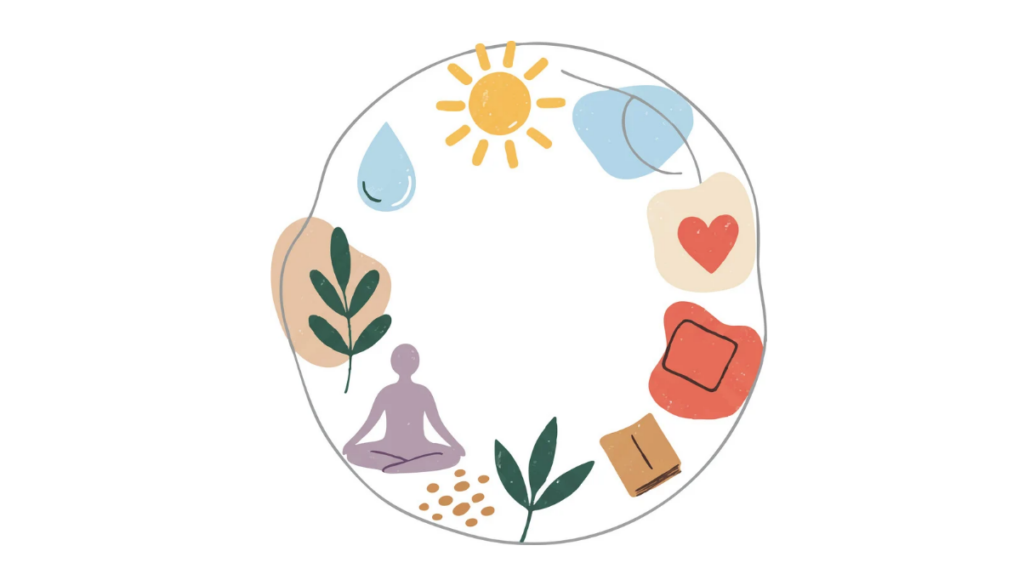
Even small habits can create powerful shifts in how you feel day to day.
Try incorporating these practices:
- Start your morning without checking your phone — take 3 deep breaths instead.
- Set gentle daily goals: shower, eat, stretch, step outside. Small steps count.
- Keep a journal to track triggers and emotions.
- Practice grounding: notice 3 things you can see, 2 things you can feel, 1 thing you can hear.
- Use affirmations like “I can handle this moment” or “I’m doing my best today.”
- Schedule downtime — rest is not laziness, it’s maintenance.
- Surround yourself with compassion. Tell yourself: I’m learning, not failing.
Self-care doesn’t replace professional treatment, but it reinforces it — helping your brain and body relearn safety, presence, and hope.
Final Thoughts: You Don’t Have to Figure It Out Alone
It’s normal to feel confused when anxiety and depression blur together. But understanding what you’re feeling is the first step toward healing. Whether your struggle shows up as constant worry, deep sadness, or a mix of both, help is available — and recovery is real.
You don’t have to carry this alone.
If you’re ready to begin your journey toward balance and peace, compassionate help is within reach.
At EmpowHer Psychiatry and Wellness, we understand that mental health isn’t one-size-fits-all. Whether you’re navigating anxiety, depression, or both, our holistic, evidence-based care focuses on the mind-body connection and the heart of your story.
📍 Located in Union, NJ
📞 Call (908) 315-9885

